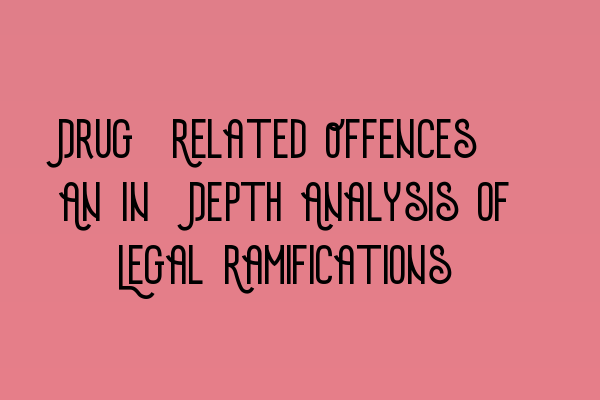Drug-Related Offences: An In-Depth Analysis of Legal Ramifications
Welcome to the SQE Criminal Law & Practice Law UK blog! In this post, we will delve into the complex world of drug-related offences and explore the legal ramifications that accompany them. Drug offences are a serious matter in the UK, and understanding the intricacies of the law is crucial for those working in the legal field.
Understanding Drug-Related Offences
Drug-related offences encompass a wide range of illegal activities, including possession, possession with intent to supply, production, and trafficking of controlled substances. The severity of these offences depends on various factors such as the type and quantity of drugs involved, the individual’s role in the offense, and any aggravating circumstances.
It is important to note that drug offences are categorized into different classes under the Misuse of Drugs Act 1971. Individuals charged with drug-related offences can face significant penalties and consequences if found guilty, including imprisonment, fines, community orders, and even asset forfeiture.
Types of Drug-Related Offences
Let’s explore some of the common drug-related offences and their legal ramifications:
1. Possession
Possession of illegal drugs is a criminal offence in the UK. The penalties for possession can vary depending on the class of drugs involved. It is essential to consult an experienced criminal solicitor who specializes in drug offences to navigate the legal complexities surrounding possession charges. For more information, you can refer to our SQE 1 Practice Exam Questions.
2. Possession with Intent to Supply
Possession with intent to supply is a more serious offence compared to simple possession. The prosecution must prove that the individual had the intention to distribute the drugs. This offence carries harsher penalties and can result in significant prison sentences. If you are interested in practice mocks, you can check out our SQE 1 Practice Mocks FLK1 FLK2.
3. Production of Controlled Substances
Producing or manufacturing controlled substances, such as cultivating marijuana or manufacturing synthetic drugs, is a grave offence. The penalties for drug production can be severe and often result in lengthy prison sentences. It is vital to seek legal advice and representation from a qualified criminal solicitor. Our SQE 2 Preparation Courses cover topics related to drug production.
4. Drug Trafficking
Drug trafficking involves the transportation and distribution of illegal drugs. This offence typically involves organized criminal networks and can span across national boundaries. Drug trafficking carries severe penalties and can lead to lengthy prison sentences and substantial fines. If you want to learn more about SQE 1 preparation, don’t forget to check out our comprehensive SQE 1 Preparation Courses.
The Legal Process: Defense Strategies and Consequences
If you or someone you know is facing drug-related charges, it is crucial to understand the legal process and available defense strategies. A skilled criminal solicitor can help navigate the complexities of the law and build a solid defense case. It is important to consult with a legal expert who is knowledgeable in drug offences. For information regarding upcoming SQE exam dates, please visit our page on SRA SQE Exam Dates.
In conclusion, drug-related offences carry severe legal ramifications that can impact individuals and society as a whole. Understanding the various types of drug offences and their consequences is crucial for legal professionals working in criminal law. If you require legal assistance or want to prepare for the SQE exams, feel free to reach out to us at SQE Criminal Law & Practice Law UK. For comprehensive SQE 1 preparation materials and courses, visit our SQE 1 Preparation Courses page, and to enhance your SQE 2 preparation, check out our SQE 2 Preparation Courses today!
